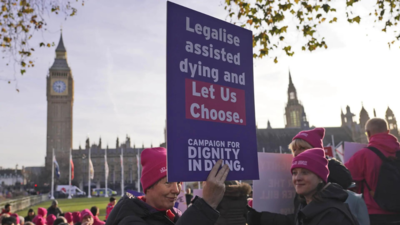British lawmakers have taken the first step toward legalising assisted dying in England and Wales, approving the “Terminally Ill Adults (End of Life)” bill in a significant vote on Friday.
The bill, which was passed by 330 votes to 275, will now move forward to further scrutiny in Parliament, marking a crucial development in a long-standing and contentious issue.
As per the news agency AP, the vote followed an emotionally charged debate that delved into issues of ethics, disability rights, and the potential impact on palliative care.
The bill would allow mentally competent adults with a terminal illness and a prognosis of six months or less to request assistance in ending their lives, under strict safeguards.
Proponents, including the bill’s sponsor, Labour MP Kim Leadbeater, argue that the legislation would grant terminally ill individuals the dignity and autonomy to make decisions about their end of life.
“It’s about giving people choice, autonomy, and dignity at the end of their lives,” Leadbeater said during the debate.
She also emphasised that the law would prevent unnecessary suffering, offering a safer alternative to individuals who currently take their own lives in secrecy due to the criminal nature of assisted suicide under current law, according to AFP.
Law draws criticism over impact on vulnerable groups
Opponents, however, expressed grave concerns over the risks to vulnerable groups, particularly the elderly and disabled, who might feel coerced into ending their lives due to societal pressures or financial burdens on their families.
As per Reuters, Conservative MP Danny Kruger strongly opposed the bill, warning that it could lead to a “state suicide service” and undermine efforts to strengthen palliative care. “True dignity consists in being cared for to the end,” he said, calling for a focus on improving support for those suffering from terminal illnesses.
The proposal also raises questions about the preparedness of the healthcare system to implement such a change. Critics argue that a shift towards assisted dying could undermine investment in palliative care services, which are crucial for improving the quality of life in a person’s final days.
The bill’s passage in the Commons represents a shift in public opinion. A series of recent polls have indicated that a majority of Britons now support assisted dying, reflecting a broader trend in other countries, such as Canada, Australia, and parts of the United States, where similar laws have been passed.
Prime Minister Keir Starmer, while remaining neutral, has previously supported assisted dying and noted that Parliament should reconsider the issue. Some members of his cabinet expressed their support for the bill, while others, including Conservative leader Kemi Badenoch, voiced their opposition.
Starmer’s neutral stance contrasts with the clear division on this topic within his party and across political lines.
The bill will now undergo further amendments in Parliament, with additional votes expected in the coming months. If passed, it could lead to a landmark change in the law, though the implementation could still be years away.
The debate has drawn passionate responses from all sides, with some faith leaders and medical professionals expressing concern over the moral implications of legalising assisted dying.
Faith-based groups have warned that the law could encourage a culture of “euthanasia” and put vulnerable people at risk.
As per Reuters, nearly 30 faith leaders signed a joint letter urging MPs to oppose the bill, arguing that society should instead focus on providing better palliative care to those at the end of their lives.
